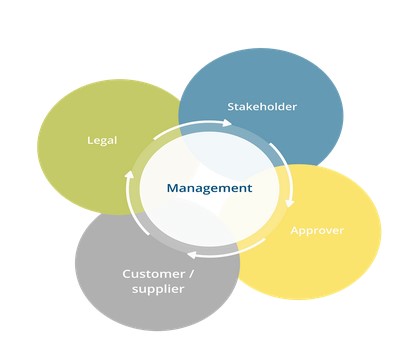Fundamentals of contract management systems
A company’s operational and financial performance can be maximized through effective contract management, while the company’s exposure to financial risk can be reduced. Companies are under increased pressure to improve their performance while simultaneously cutting costs. Because managing contracts takes a significant amount of time, it is essential to have a system that is both effective and automated.
Aspects fundamental to contracts
A contract defines the procedures and parameters under which two parties will carry out their commercial dealings with one another. The relevance of a company’s income and expenses in its contracts substantially affects its capacity to turn a profit.
Due to a simple omission, a company could lose thousands of dollars because their contract was poorly written. Effective contract management can strengthen company relationships and boost long-term profitability if administered correctly. During the negotiations for the management of contracts, a legal department or an attorney should be present. Terminology must be accurate while dealing with contract management.
Source: https://images.app.goo.gl/o3EmtcYEsfENfmm76
The management of contracts requires the completion of a significant number of processes. Starting with the pre-award stage, several responsibilities must be fulfilled before a company, or an individual may be awarded a contract. The middle B stage is rewarding. This encompasses all of the legal documentation about the contract. After the award, we came in third. Here comes the contract management system and maintenance.
Although the management of contracts can be simplified into only three steps, the process is more involved and can be further segmented. We will provide further information at a later time.
Contract management essentials
Simply being knowledgeable about how to manage contracts is not enough. Providing staff with the methods and resources they need to fulfill their compliance and analytical responsibilities. The following are the effects of effective contract management:

Source: https://images.app.goo.gl/BUfvhGMsKA9zn5x1A
There are positive effects on one’s finances and one’s business.
- The seller is receptive to requests and works well with customers. It is not typical for parties to a contract to disagree or for unexpected events to occur.
- The level of service provided to both parties is adequate.
- Contract administration is made more accessible by efforts taken both after awards have been made and before. During the pre-award phase of the contract, the primary focus should be on the aim of the contract as well as the supplier’s ability to meet the specifications. The post-award administration of the contract requires that consideration be given to it. Research and a detailed contract are both necessary to eliminate surprises.
The administration of a contract needs
Flexibility on both sides requires parties to alter clauses in response to shifting conditions. Problems are unavoidable; hence, firms must be allowed to change contract conditions. The management of contracts requires the completion of a significant number of processes. The drafting, collaboration, signing, tracking, and renewal of a contract are the five processes that comprise the administration of a contract.
We can determine the stages’ steps. There are a total of nine separate steps throughout all five of the available levels. At the end of the quarter, this helped to alleviate the contract crunch that had been occurring. The following metrics are included for each phase:
- Demands. Managing contracts starts with identifying existing contracts and the documentation that goes along with them.
- Contract preparation Contract is authorized easier by utilizing automated solutions for contract administration.
- Contractual discussions To reduce the amount of time spent debating, workers must be able to review several versions of the contract.
- Contract approval The managerial approval process is where the majority of obstacles arise. Users can construct concurrent and serial approval workflows, which speeds up the decision-making process.
- Contract execution. The signing process can be completed much more quickly when an electronic signature and fax are used to finalize a contract.
- Monitoring- A significant amount of project management is required to guarantee that all essential parties will fulfill their obligations and that the value of the contract will not decrease.
- Variables It is not easy to acquire all the paperwork relevant to contracts. Contracts must be revised if neglected items are found and brought to light.
- Reports and checks and balances The process of managing contracts entails more than just creating and storing contracts in a repository. Contract audits analyze the compliance of both parties with the terms of the agreement and identify any problems that may exist.
- Renewing. Handling manual contracts might result in missed contract renewals, resulting in lost revenue. The process of automating the generation of contracts and opportunities for renewal.
Contract management requires nine critical steps. Important is contract management. Contract administrators are responsible for keeping an eye on any adjustments made to the various types of contracts as they develop. If an employee or company is unsatisfied with the terms of a contract, the terms of the contract can be amended. Maintain the level of satisfaction enjoyed by both parties throughout the performance of contractual obligations.
In contract management, lifecycle management is crucial. The effectiveness of vendors, as well as their potential risks, are evaluated by contract management. If a vendor does not fulfill their contractual commitments, the company may be obliged to either alter the contract or implement discipline.





